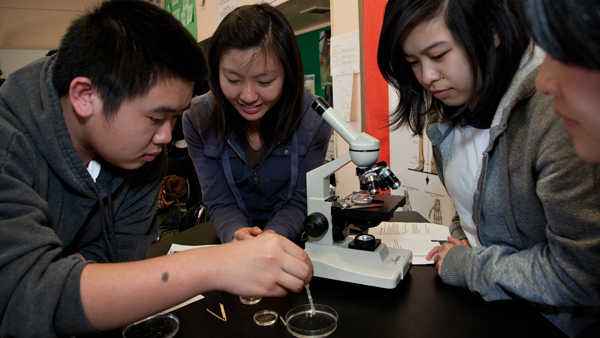UCSF to Lead First Annual Bay Area Science Festival: October 29-November 6

Neuroscience graduate student Cheuk Tong, second from left, shows Wallenberg High School students Jeffery Lau, left, and Shirley Chang, second from right, how zebrafish respond to visual stimulation during a lesson organized by UCSF's Science Education & Health Partnership (SEP) program. SEP, which was founded in 1987, is now organizing the Bay Area Science Festival.
The San Francisco Bay Area is known for its groundbreaking work in science and technology, yet many who call the Bay Area home have little to no opportunity to experience the wonder of science.
From October 29 to November 6, 2011, the public is invited to participate in the first annual Bay Area Science Festival, a series of events designed to showcase the region's catalytic role in scientific progress and provide innovative opportunities to build community around science, technology and engineering.
Led by the University of California, San Francisco (UCSF), the Bay Area Science Festival has brought together an unprecedented brain trust of the region’s scientific and educational partners to produce what is expected to be one of the largest science-based events ever held in the United States. Most of the activities are free.
“The Bay Area has long been a worldwide leader in science and technology innovation and this region remains an incubator of countless breakthroughs,” said UCSF Chancellor Susan Desmond-Hellmann, MD, MPH. “The Bay Area Science Festival is a region-wide celebration of our unique innovative spirit; a celebration that will showcase our area’s incredible resources to help reinvigorate a passion for science and technology among Bay Area residents. UCSF is pleased to lead the inaugural Bay Area Science Festival and we hope that it will continue for years to come.”
Featuring more than 100 fun, interactive science and technology events at local venues from Santa Rosa to San Jose, the Bay Area Science Festival will include provocative lectures, hands-on activities, exhibitions, tours of cutting-edge facilities, guided hikes and neighborhood stargazing. Activities will include:
- Discovery Days: Three large-scale free events – One each at Cal State East Bay in Hayward (Saturday, Oct. 29), Infineon Raceway in Sonoma (Saturday, Nov. 5) and at AT&T Park in San Francisco (Sunday, Nov. 6) will feature scientific happenings akin to education-based rock concerts, with hands-on experiments, demonstrations, exhibits and family-oriented musical and theatrical performances.
- Bay Area Star Party: On the evening of Saturday, Nov. 5, a number of local observatories will be open, and both professional and amateur astronomers will be on hand at public sites to offer telescope viewing and observing tips to participants.
- Wonder Dialogues: A series of provocative conversations featuring accomplished scientific researchers, these talks will take participants to the edge of scientific understanding with compelling discussions - ranging from the limits of the human brain to the origins of the universe.
The Bay Area Science Festival is partnering with the San Francisco Public Library and Peninsula Library System to encourage the community to read “Packing for Mars,” in which Bay Area author Mary Roach tackles the strange science of space travel. A series of book clubs, author discussions and evening events inspired by the best selling nonfiction work will be held at public library branches throughout the Bay Area.

“To plan the festival, we have brought together the Bay Area’s leading academic, scientific, corporate and nonprofit institutions with the collective aim of providing accessible science programming to every Bay Area resident,” said Kishore Hari, who joined UCSF’s Science & Health Education Partnership program in November 2009 to lead the science festival. “By putting science at everyone’s fingertips, we hope to engage our communities in its wonders and inspire the next generation of scientists and engineers.”
UCSF is a leading university dedicated to promoting health worldwide through advanced biomedical research, graduate-level education in the life sciences and health professions, and excellence in patient care.
In addition to UCSF and the National Science Foundation, partners for the Bay Area Science Festival include Astronomical Society of the Pacific, BayBio, the Buck Institute for Age Research, the California Academy of Sciences, California State University East Bay, Chabot Space & Science Center, KQED, the Lawrence Hall of Science, Lawrence Berkeley National Laboratory, Lawrence Livermore National Laboratory, the Mathematical Sciences Research Institute, Stanford University, San Francisco State University, the San Jose Children’s Discovery Museum, SETI Institute, the Tech Museum, the University of California, Berkeley, and the United States Geological Survey.
Specific event and venue details about the first annual Bay Area Science Festival will be announced in August at a special event for the public and media, featuring regional and national political and scientific leaders.
For ongoing information about the events, visit the Bay Area Science Festival website.
Photo by Susan Merrell